2017-2018学年高中英语Module3TheViolenceofNature课时跟踪练(三)OtherPartsoftheModule外研版必修3
- 格式:doc
- 大小:361.00 KB
- 文档页数:5
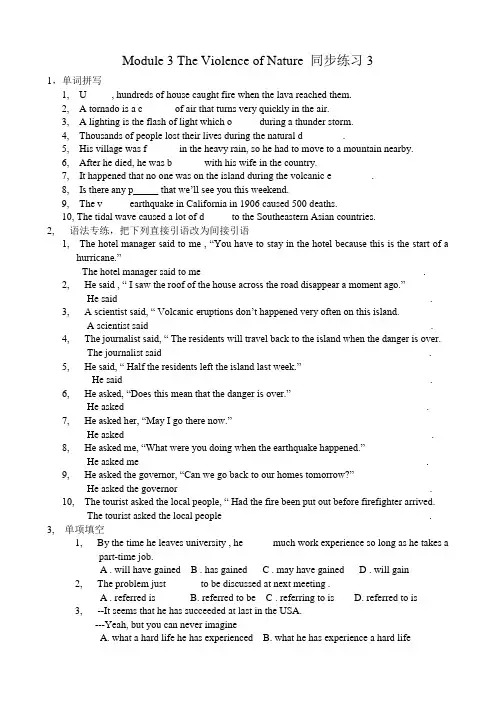
Module 3 The Violence of Nature 同步练习31,单词拼写1, U_____, hundreds of house caught fire when the lava reached them.2, A tornado is a c______ of air that turns very quickly in the air.3, A lighting is the flash of light which o_____ during a thunder storm.4, Thousands of people lost their lives during the natural d________.5, His village was f______ in the heavy rain, so he had to move to a mountain nearby.6, After he died, he was b______ with his wife in the country.7, It happened that no one was on the island during the volcanic e________.8, Is there any p_____ that we’ll see you this weekend.9, The v_____ earthquake in California in 1906 caused 500 deaths.10, The tidal wave caused a lot of d_____ to the Southeastern Asian countries.2, 语法专练,把下列直接引语改为间接引语1, The hotel manager said to me , “You have to stay in the hotel because this is the start of a hurricane.”The hotel manager said to me ____________________________________________.2, He said , “ I saw the roof of the house across the road disappear a moment ago.”He said ______________________________________________________________.3, A scientist said, “ Volcanic eruptions don’t happened very often on this island.A scientist said ________________________________________________________.4, The journalist said, “ The residents will travel back to the island when the danger is over.The journalist said _____________________________________________________.5, He said, “ Half the residents left the island last week.”He said _____________________________________________________________.6, He asked, “Does this mean that the danger is over.”He asked ____________________________________________________________.7, He asked her, “May I go there now.”He asked _____________________________________________________________.8, He asked me, “What were you doing when the earthquake happened.”He asked me _________________________________________________________.9, He asked the governor, “Can we go back to our homes tomorrow?”He asked the governor __________________________________________________.10, The tourist asked the local people, “ Had the fire been put out before firef ighter arrived.The tourist asked the local people _________________________________________. 3, 单项填空1, By the time he leaves university , he _____ much work experience so long as he takes a part-time job.A . will have gainedB . has gainedC . may have gainedD . will gain2, The problem just ______ to be discussed at next meeting .A . referred is B. referred to be C . referring to is D. referred to is3, --It seems that he has succeeded at last in the USA.---Yeah, but you can never imagine _________A. what a hard life he has experiencedB. what he has experience a hard lifeC. he has experienced what a hard lifeD. what a hard life has he experienced4, It suddenly ________ to me that the man might be the robber the police had been hunting for.A. comesB. referredC. happenedD. occurred5, He kept looking at her , wondering whether he _______ her somewhere .A. sawB. has seenC. seesD. had seen6, There was a big fire in the building last night. _______ , all the people were able to escape.A. UnluckilyB. FortunatelyC. To be sureD. Above all7, Li ly’s mobile phone was left in a taxi accidentally , never ______ again .A. to findB. to be foundC. findingD. being found8, Children need many thing , but _______ they need love.A. above allB. in allC. as wellD. after all9, The enemy general ordered all the house _______ after they broke though the defense line.A. be set fire toB. were set fire toC. caught fireD. should be caught fire10, During the terrible storm last night ,a ________ tree fell over a _______ car and caused ________.A. falling; slept; great damageB. fallen; slept ; a great deal of damageC. falling; sleeping; a great deal of damageD. falling; sleeping; great damages11, The teacher _______ the exam marks on the wall so that the students could see them.A. put upB. put onC. take downD. take off12, The boss went into the house ,_______ the five boys _____ in the rain.A. left ; standingB. leaving ; standingC. left; standD. leaving; stand13, She started with the aim of doing harm to others only _______ ruining herself.A. to end up withB. ending up withC. to endD. ending in14, On all occasions he _______ us as “ lads”A. calledB. namedC. shouldD. referred to15, When the firemen arrived ,the office building _______ for an hour.A. had been on fireB. was on fireC. had caught fireD. caught fire4,完形填空Some boys join the Navy when they are quite young, and they then are given a course of training as sailors. It is a long course; both on land ___1__ at sea .During it ,the boys study things ____2___ maths and science as well as learn to tie knots , fire guns and __3___ other practical things .One of the important things they are __4__ is how to swim. In the old days , many sailors were ____5___ to swim, but now it is rare to find one that can’t .___6___ one school for sailors , the swimming instructor was good.___7__ had never had a boy whom he had___8___ to teach to swim by the time the course ended .One year, however , ____9___ was one particular boy on the training course ___10___ seemed quite unable to learn to __11__ . The instructor tried giving him extra lessons , but he had __12__ success at all, whatever he did. In the end, as the time drew nearfor the __13__ to end, he had to admit defeat.One day, he called the boy __14__ after the swimming lesson and said, “ John , I have tried __15__ to teach you to swim, but I have failed ___16____ the first time in my life. Now I want to give you a piece of ___17____. Listen carefully.” “Yes, sir ,” answered the boy. “Well,” the instructor ___18___ on, “ if you are ever in a ship and it __19___ , just dive off the side into the sea, go right down to the bottom and ___20___ to the shore as fast as you can. That’s the only way you will save your life.”1. A. or B. nor C. and D. besides2. A. such B. like C. both D. by3. A. do B. teach C. finish D. watch4. A. learned B. studied C. done D. taught5. A. supposed B. unable C. able D. considered6. A. At B. For C. By D. Of7. A. It B. They C. She D. He8. A. managed B. tried C. failed D. occurred9. A. it B. there C. that D. this10. A. who B. which C. it D. what11. A. play B. swim C. fire D. sail12 A. some B. any C. none D. no13. A. school B. boy C. course D. swimming14. A. aside B. away C. off D. on15. A. hardly B. enough C. merely D. hard16. A. for B. on C. as D. of17. A. news B. idea C. advice D. word18. A. put B. said C. came D. went19. A. floats B. moves C. sinks D. drops20. A. swim B. run C. walk D. jump5,阅读理解Smog is a mixture of smoke and fog. It can kill people .If you don’t believe it, I can tell you a story .One the night of December 1, 1930, a fog moved over a valley in Belgium. Many factories in the valley sent smoke into air. This made a dark smoke. People in the valley began to cough. The smoke remained for four days .During that time , thousands of people became ill. The hospital was filled with sick people. Sixty people died.Donora is an American factory town , in 1948 , a killer smog made half of its people illLondon used to be a city known for its “ black fogs” . In the winter of 1952, a white fog moved into the city. It soon turned into black smog when meeting with the black smoke by the factories . The whole city became very dark. People had to walk in front of the buses to guide them .This was the worst case for air pollution in history .When it was dark, more than 1,000 people had been killed by the black smog.1. From the passage we can say the smog is _________________A. the result of air pollutionB. a mixture of black smokeC. good for healthD. both A and B2. From the passage we can know that _______ had the heaviest smog in the historyA. LondonB. a city that was not mentionedC. DonoraD. a valley in Belgium3. The phrase “ to guide them” meane ________A. to show the wayB. to clean the street for the busesC. to stop the busesD. to run before the buses4. Which of the following is true?A. London was famous for its “ black smogs”.B. A dark smog can be formed when many factories send smokes into a white fog.C. Smog is a mixture of air and fog.D. Both A and B.参考答案Keys1, (1) Unfortunately / Unluckily (2) column (3) occurs (4) disaster (5) flooded(6) buried (7) eruption (8) possibility (9) violent (10) tropical2, (1) ----that I had to stay in the hotel because that was the start of a hurricane.(2) ----that he had seen the roof of the house across the road disappeared a moment before .(3) ----that volcanic eruption didn’t happen very often on that island .(4) ----that the residents would travel back to the island when the danger was over.(5) ----that half the residents had left the island the week before .(6) ----if (whether) this meant that the danger was over.(7) ----if (whether) he might come here then.(8) ----what I was doing when the earthquake happened.(9) ----if (whether) they could go back to their home the next day.(10)---if (whether) the fire had been put out before the firefighter arrived.3, 1---5 ADADD 6—10 BBAAC 11---15 BBADA4, 1—5 CBADB 6---10 ADCBA 11---15 BDCAD 16—20 ACDCB5, 1—4 DAAD。
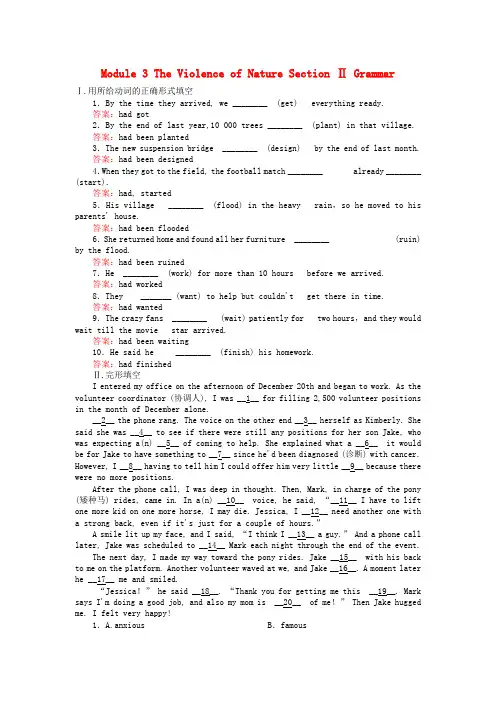
Module 3 The Violence of Nature Section Ⅱ GrammarⅠ.用所给动词的正确形式填空1.By the time they arrived, we ________ (get) everything ready.答案:had got2.By the end of last year,10 000 trees ________ (plant) in that village.答案:had been planted3.The new suspension bridge ________ (design) by the end of last month.答案:had been designed4.When they got to the field, the football match ________ already ________ (start).答案:had, started5.His village ________ (flood) in the heavy rain,so he moved to his parents' house.答案:had been flooded6.She returned home and found all her furniture ________ (ruin) by the flood.答案:had been ruined7.He ________ (work) for more than 10 hours before we arrived.答案:had worked8.They _______ (want) to help but couldn't get there in time.答案:had wanted9.The crazy fans ________ (wait) patiently for two hours,and they would wait till the movie star arrived.答案:had been waiting10.He said he ________ (finish) his homework.答案:had finishedⅡ.完形填空I entered my office on the afternoon of December 20th and began to work. As the volunteer coordinator (协调人), I was __1__ for filling 2,500 volunteer positions in the month of December alone.__2__ the phone rang. The voice on the other end __3__ herself as Kimberly. She said she was __4__ to see if there were still any positions for her son Jake, who was expecting a(n) __5__ of coming to help. She explained what a __6__ it would be for Jake to have something to __7__ since he'd been diagnosed (诊断) with cancer. However, I __8__ having to tell him I could offer him very little __9__ because there were no more positions.After the phone call, I was deep in thought. Then, Mark, in charge of the pony (矮种马) rides, came in. In a(n) __10__ voice, he said, “__11__ I have to lift one more kid on one more horse, I may die. Jessica, I __12__ need another one with a strong back, even if it's just for a couple of hours.”A smile lit up my face, and I said, “I think I __13__ a guy.” And a phone call later, Jake was scheduled to __14__ Mark each night through the end of the event.The next day, I made my way toward the pony rides. Jake __15__ with his back to me on the platform. Another volunteer waved at we, and Jake __16__. A moment later he __17__ me and smiled.“Jessica!” he said __18__. “Thank you for getting me this __19__. Mark says I'm doing a good job, and also my mom is __20__ of me!” Then Jake hugged me. I felt very happy!1.A.anxious B.famousC.responsible D.suitable2.A.Suddenly B.FortunatelyC.Finally D.Slowly3.A.considered B.viewedC.made D.introduced4.ing B.callingC.running D.leaving5.A.ability B.opinionC.chance D.problem6.A.relief B.surpriseC.failure D.question7.A.say B.donateC.need D.do8.A.risked B.regrettedC.forgot D.stopped9.A.approval B.moneyC.work D.doubt10.A.tired B.happyC.calm D.sweet11.A.Because B.AsC.Though D.If12.A.never B.reallyC.almost D.seldom13.A.require B.arrangeC.know D.order14.A.help B.praiseC.call D.instruct15.A.jumped B.liedC.slept D.sat16.A.turned up B.turned aroundC.turned off D.turned out17.A.recognized B.admiredC.met D.accepted18.A.patiently B.quietlyC.excitedly D.coldly19.A.gift B.lessonC.friend D.job20.A.ashamed B.proudC.aware D.fond【文章大意】本文为记叙文。
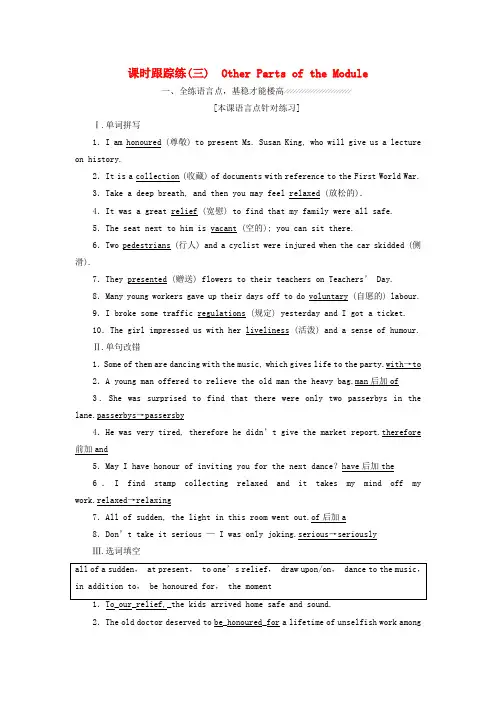
课时跟踪练(三) Other Parts of the Module一、全练语言点,基稳才能楼高[本课语言点针对练习]Ⅰ.单词拼写1.I am honoured (尊敬) to present Ms. Susan King, who will give us a lecture on history.2.It is a collection (收藏) of documents with reference to the First World War.3.Take a deep breath, and then you may feel relaxed (放松的).4.It was a great relief (宽慰) to find that my family were all safe.5.The seat next to him is vacant (空的); you can sit there.6.Two pedestrians (行人) and a cyclist were injured when the car skidded (侧滑).7.They presented (赠送) flowers to their teachers on Teachers’ Day.8.Many young workers gave up their days off to do voluntary (自愿的) labour.9.I broke some traffic regulations (规定) yesterday and I got a ticket.10.The girl impressed us with her liveliness (活泼) and a sense of humour.Ⅱ.单句改错1.Some of them are dancing with the music, which gives life to the party.with→to 2.A young man offered to relieve the old man the heavy bag.man后加of3.She was surprised to find that there were only two passerbys in the lane.passerbys→pas sersby4.He was very tired, therefore he didn’t give the market report.therefore 前加and5.May I have honour of inviting you for the next dance?have后加the6.I find stamp collecting relaxed and it takes my mind off my work.relaxed→relaxing7.All of sudden, the light in this room went out.of后加a8.Don’t take it serious — I was only joking.serious→seriouslyⅢ.选词填空all of a sudden, at present, to one’s relief, draw upon/on, dance to the music,in addition to, be honoured for, the moment.To_our_relief,_the kids arrived home safe and sound.2.The old doctor deserved to be_honoured_for a lifetime of unselfish work amongthe sick natives.3.I am quite at leisure at_present if you want me to help you.4.He draws_upon/on his childhood memories for the material of most of his stories.5.The_moment I reached the platform the train began to move.6.We have no choice but to dance_to_the_music that is being played.7.In_addition_to a large collection of scientific works in Chinese, our library contains many scientific books in foreign languages.8.It was sunny and then all_of_a_sudden,_it clouded over and began to rain.[本单元语言点温故练习]Ⅰ.单句语法填空1.If your skill can be combined with my experience, we are sure to succeed.2.As an actor, you have to draw on/upon your experience to create believable characters.3.We are going to give a welcome meeting in honour of Mr. Clark who come to visit our company.4.He always says and does what he thinks, regardless of other people’s feelings.5.To our great relief, the wolf was caught by the police.6.I’m too depressed (depress) and I need to clean out my mind.7.Since the beginning of the vacation, I have_been_travelling (travel) across the country.8.Being ambitious (ambition), he always had an eye to the main chance.9.What do you do for relaxation (relax) in your spare time?10.We have reached an agreement with him in regard to the shipment.Ⅱ.完成句子1.In order to be a good writer, you have to draw_upon_your_imagination (利用你的想象力) and life experience.2.Don’t worry. We will try to make_contact_with_other_schools (与其他学校取得联系) in the area to help your child.3.All_of_a_sudden (突然), I realized there was something wrong.4.It was the technology brought in from other companies that gave_life_to_this_company (赋予这家公司活力).5.It’s not polite to point at or talk about strangers in_public (当众).6.In_honour_of_his_achievement (为了纪念他的成就), we held a celebration forhim.7.We haven’t got to see our teacher since we_graduated_from_the_school (我们从这所学校毕业).8.They are ready to take action regardless_of_the_consequence (无论结果如何).二、勤练高考题型,多练自能生巧Ⅰ.阅读理解My sixyearold daughter lay in the hospital bed. “Mommy?” she asked. “Will you stay with me the whole time?”“You know I can’t be in the operating room,”I said carefully, not wanting to scare her. “But Daddy and I will be waiting right outside.” Elizabeth nodded (点头), but her eyes looked troubled. It had been too long since I saw that big smile of hers.I wanted to tell her everything would be okay and promise that this would be the last time she’d have to go through. But what if something went wrong again? She’d been so brave that day of the accident. When she fell off her bike in our backyard, I rushed her to the emergency room, trying not to panic. After she had spent three weeks in a cast (石膏), her leg didn’t improve. Now she needed surgery. How could I comfort her when I needed comfort myself?There was a knock at the door. A nurse? But a woman without a white coat came in. “Hi!” the woman said. “I’m the chaplain (牧师) here, and I’ve got a present for Elizabeth.” She handed a brightblue box to my daughter. Elizabeth sat up, opened the gift and started pulling out the items one by one: candies, crayons, and a toy in the shape of a star. She hugged the star, cheering up for the first time after she entered the hosp ital. “Thank you,” she said. She looked through the box once more. She pulled out a card. “Mommy, look!”“A card,” I said. I held her hand and read aloud: “Keep me in the loving care and bless all those who love me too.”There was that big smile of hers! I looked at the box closely. The sentence “It’s for kids’comfort” with the name of the charitable organization was written across the front. I thanked the chaplain again and again. I thought it was not only for kids’ comfort but for moms’ too.语篇解读:作者女儿的腿需要做手术。
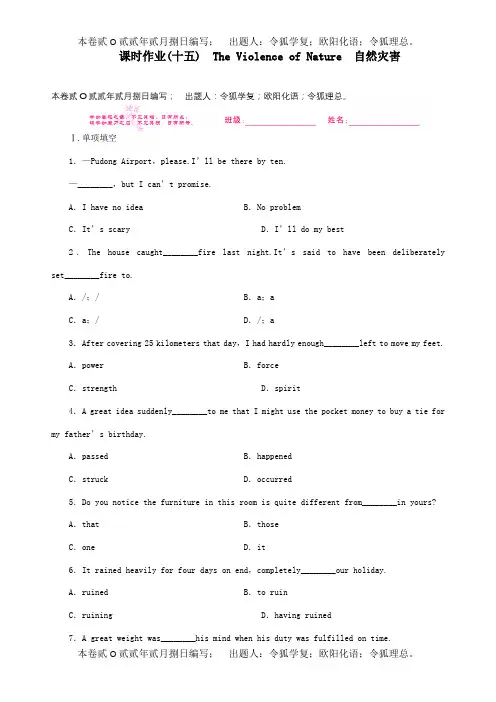
课时作业(十五) The Violence of Nature 自然灾害本卷贰O贰贰年贰月捌日编写;出题人:令狐学复;欧阳化语;令狐理总。
Ⅰ.单项填空1.—Pudong Airport,please.I’ll be there by ten.—________,but I can’t promise.A.I have no idea B.No problemC.It’s scary D.I’ll do my best2.The house caugh t________fire last night.It’s said to have been deliberately set________fire to.A./;/ B.a;aC.a;/ D./;a3.After covering 25 kilometers that day,I had hardly enough________left to move my feet.A.power B.forceC.strength D.spirit4.A great idea suddenly________to me that I might use the pocket money to buy a tie for my father’s birthday.A.passed B.happenedC.struck D.occurred5.Do you notice the furniture in this room is quite different from________in yours?A.that B.thoseC.one D.it6.It rained heavily for four days on end,completely________our holiday.A.ruined B.to ruinC.ruining D.having ruined7.A great weight was________his mind when his duty was fulfilled on time.A.taken in B.taken offC.put out D.given out8.The kindhearted couple decided to adopt the child whose parents________in an accident.A.had been killed B.are killedC.had killed D.killed9.—Have you had any________in teaching?—Yes,I used to be a teacher,and I had some very interesting________during the period.A.experiences;experience B.experience;experienceC.experience;experiences D.experiences;experiences10.—I’m sorry I stepped outside for a smoke.I was ve ry tired—There is no________for this while you are on duty.A.reason B.excuseC.cause D.explanation11.When________about his success,the great man said with a big smile on his face:“One sometimes finds what one is not looking for.〞A.being asked B.askedC.asking D.to ask12.—Do you think________worthwhile to go all the way to Los Angeles to buy that computer.—Well,I’m going to visit some relatives,too.A.it B./C.this D.that13.The problem just________to be discussed at the next meeting.A.referred is B.referred to beC.referring to is D.referred to is14.—How________do you attend the evening classes?—________,three times per week.A.long;On the whole B.soon;Generally speakingC.much;In all D.often;On average15.Is________any possibility________David can win the first prize in the match?A.it;whether B.it;thatC.there;whether D.there;thatⅡ.完形填空(2021年三十校联考) Valentine’s Day was the time my father chose to sho w his love for the special people in his life.Over the years I fondly (天真地) thought__1__him as my “Valentine man〞.My first recollection of the__2__he could bring to Valentine’s Day came when I was six.That morning at the breakfast table I found a card and a giftwrapped package at my chair.The card was__3__“Love,Dad〞 and the gift was a ring with a small piece of red glass to__4__my birthstone,a ruby (红宝石).There is__5__difference between red glass and rubies to a child of six,and I remember__6__that ring with pride that all the cards in the world__7__not surpass (超越).__8__I grew older,the gifts gave__9__to heartshaped boxes filled with my__10__chocolate and always included a__11__card signed “Love,Dad〞.In those years my thankyou became__12__of a perfunctory (敷衍) response.The cards seemed less__13__,and I took for granted that the Valentine would__14__be there.I had__15__my hopes and dreams in receiving cards and gifts from “significant others〞and “Love,Dad〞just didn’t seem quite__16__.His final card rem ains on my desk today.It’s a__17__of how special fathers can be and how important it has been to me over the years to know that I had a father who continued a__18__of love with simple acts of understanding and an ability to express happiness over the people in his life.Those things never__19__,nor does the memory of a man who never__20__being my valentine.1.A.of B.about C.up D.over2.A.memory B.magic C.puzzle D.present3.A.read B.written C.shown D.signedB.resemble C.represent D.replace5.A.much B.little C.great D.lessB.owning C.wearing D.watching7.A.could B.did C.must D.should8.A.Because B.Since C.When D.As9.A.room B.way C.honour D.seat10.A.favorite B.lovely C.dear D.precious11.ual B.common C.strange D.special12.A.less B.little C.more D.much13.A.important B.beautiful C.familiar D.standard14.A.surely B.always C.regularly D.often15.A.let B.kept C.placed D.remembered16.A.suitable B.enough C.effective D.sacred17.A.signal B.certificate C.consequence D.reminder18.A.tradition B.hobby C.habit D.custom19.A.lose B.die C.miss D.appear20.A.thought B.wanted C.tried D.stoppedⅢ.阅读理解(2021年三模,D) Marriages improve after children grow up and move out,according to an academic study,which suggests an “empty nest〞 is not always a bad thing.Popular wisdom has it that parents’ relationships may suffer once their young fly the coop,because they feel they have lost their purpose in life.However,a new study by researchers at the University of California,Berkeley,has found that many couples actually feel happierwhen their children leave home because they are able to enjoy spending time together.In total,123 American mothers born in the 1930s were tracked for 18 years and asked to rate their satisfaction levels shortly after marrying,when they were bringing up babies,once their children reached their teenage years and finally at age 61,when almost all had “empty nests〞.Although not all said they were happier in general,most claimed their marriages had improved since their children had left home.Researchers believe this is not just because the spouses were spending more time together,but because they were able to enjoy each other’s company more.One of the participants in the study,which is published in the journal Psychological Science,said:“Once the kids grow up...there’s some of that stress removed...that responsibility removed,so things are a little more relaxed.〞Psychologist Sara Gorchoff,who carried out the investigation,said:“The takehome message for couples with young children is ‘hang in there’.〞Her coauthor Oliver John added:“Don’t wait until your kids leave home to schedule quality time with your partner.〞However,Dr Dorothy Rowe,from the British Psychological Society,said the effects of living in an “empty nest〞will depend on the parents’ relationship with their children.“If you’re just waiting for them to leave home so you can get on with your life,then of course you’ll be pleased to see them go,〞 she said,“But if you’ve built your life around your children you’ll be terribly lonely.For some parents,their world falls apart when their children leave.〞1.It is commonly believed that________.A.marriages improve after children leave homeB.an “empty nest〞 is always a happy thingC.parents’ relationships may suffer once their young grow up and move outD.parents will be pleased after their children leave home2.When did many couples feel happier according to the study?A.At age 61,when almost all had “empty nests〞.B.Shortly after marrying.C.Once their children reached their teenage years.D.When they were bringing up babies.3.Marriages improve after children fly the coop not because______.A.many couples are able to spend time togetherB.many couples are able to enjoy each other’s companyC.things are a little more relaxedD.many couples needn’t work at all4.The author of the passage tends to agree that________.A.parents should build their life around their kidsB.parents should schedule quality time with each other before kids leave homeC.parents’ relationship with their kids has no effect on marriages at allD.parents should be pleased to see their kids leave home课时作业十五Ⅰ.单项填空1.D 由上句可知乘客要十点前到达浦东机场,根据答语后句“但是我不能保证〞,可知司机说“我会尽力的〞(I’ll do my best)。
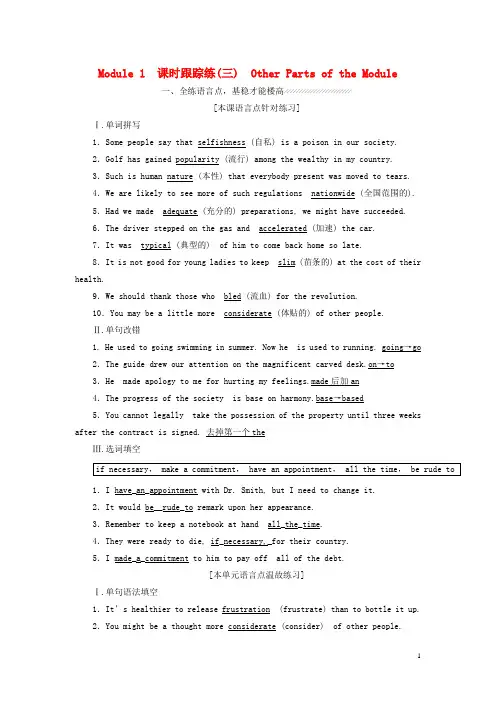
1 Module 1 课时跟踪练(三) Other Parts of the Module 一、全练语言点,基稳才能楼高 [本课语言点针对练习] Ⅰ.单词拼写 1.Some people say that selfishness (自私) is a poison in our society. 2.Golf has gained popularity (流行) among the wealthy in my country. 3.Such is human nature (本性) that everybody present was moved to tears. 4.We are likely to see more of such regulations nationwide (全国范围的). 5.Had we made adequate (充分的) preparations, we might have succeeded. 6.The driver stepped on the gas and accelerated (加速) the car. 7.It was typical (典型的) of him to come back home so late. 8.It is not good for young ladies to keep slim (苗条的) at the cost of their health. 9.We should thank those who bled (流血) for the revolution. 10.You may be a little more considerate (体贴的) of other people. Ⅱ.单句改错 1. He used to going swimming in summer. Now he is used to running. going→go 2.The guide drew our attention on the magnificent carved desk.on→to 3.He made apology to me for hurting my feelings.made后加an 4.The progress of the society is base on harmony.base→based 5.You cannot legally take the possession of the property until three weeks after the contract is signed. 去掉第一个the Ⅲ.选词填空 错误! 1.I have_an_appointment with Dr. Smith, but I need to change it. 2.It would be__rude_to remark upon her appearance. 3.Remember to keep a notebook at hand all_the_time. 4.They were ready to die, if_necessary,_for their country. 5.I made_a_commitment to him to pay off all of the debt. [本单元语言点温故练习] Ⅰ.单句语法填空 1.It’s healthier to release frustration (frustrate) than to bottle it up. 2.You might be a thought more considerate (consider) of other people. 2
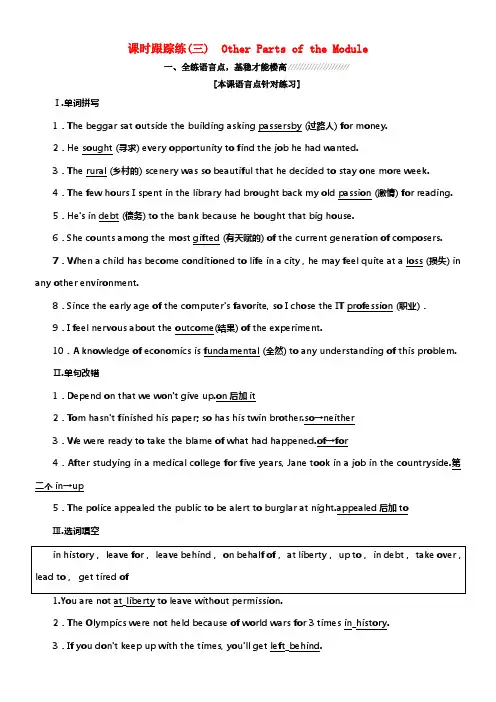
课时跟踪练(三) Other Parts of the Module一、全练语言点,基稳才能楼高[本课语言点针对练习]Ⅰ.单词拼写1.The beggar sat outside the building asking passersby (过路人) for money.2.He sought (寻求) every opportunity to find the job he had wanted.3.The rural (乡村的) scenery was so beautiful that he decided to stay one more week.4.The few hours I spent in the library had brought back my old passion (激情) for reading.5.He's in debt (债务) to the bank because he bought that big house.6.She counts among the most gifted (有天赋的) of the current generation of composers.7.When a child has become conditioned to life in a city , he may feel quite at a loss (损失) in any other environment.8.Since the early age of the computer's favorite, so I chose the IT profession (职业).9.I feel nervous about the outcome(结果) of the experiment.10.A knowledge of economics is fundamental (全然) to any understanding of this problem.Ⅱ.单句改错1.Depend on that we won't give up.on后加it2.Tom hasn't finished his paper; so has his twin brother.so→neither3.We were ready to take the blame of what had happened.of→for4.After studying in a medical college for five years, Jane took in a job in the countryside.第二个in→up5.The police appealed the public to be alert to burglar at night.appealed后加toⅢ.选词填空in history,leave for,leave behind,on behalf of,at liberty,up to,in debt,take over,lead to,get tired of1.You are not at_liberty to leave without permission.2.The Olympics were not held because of world wars for 3 times in_history.3.If you don't keep up with the times, you'll get left_behind.4.The path led_to a tiny village situated on the steep sides of a mountain.5.On_behalf_of my company, I would like to welcome you here.6.We left_for the station so early as to catch the first train.7.When he retired, his eldest son took_over the company.8.If she isn't up_to the job, she'll just have to leave.9.If you get_tired_of working there, you can come to my company.10.You will end up in_debt if you keep on spending money like that.[本单元语言点温故练习]Ⅰ.单句语法填空1.He is a university student and majors in chemistry.So it is with his younger brother.2.His wonderful performances appeal to all ages and social groups in China.3.The sudden weather change led to the delay of the project and great losses.4.What made my sister upset was that up to five hundred graduates had applied the job she wanted.5.A study shows that many passengers basically (basic) have no consciousness that they should wear a seat belt.6.We have taken effective (effect) measures to preserve our natural resources.7.The company is fortunate to have such highly skilled (skill) workers.8.The drug is suspected of causing over 200 deaths.9.This disturbing (disturb) news really upset me so that I couldn't sleep well.10.This is just what we have long sought (seek) for.Ⅱ.完成句子1.I hope that all the people can live a healthy life for_all_time (永久).2.It has been found that smoking does have_an_effect_on_the_health (对健康有阻碍) of the smokers.3.Many people are_said_to_be_infected_with_diseases (听说被疾病感染) involved with pollution.4.It depends_on (取决于) whether they have enough experience.5.The police appealed_to_people_to_drive_slowly (呼吁人们开得慢点) during the rush hours.6.Never get_tired_of_doing_little_things (厌烦做小事) for others. Sometimes those things occupy the biggest part of their hearts.7.I have to delete some useless files, because the new files will_take_up_a_lot_of_disk_space (将会占去磁盘许多空间).8.The discovery of new evidence led_to_the_thief_being_caught (致使窃贼被抓了).二、勤练高考题型,多练自能生巧Ⅰ.阅读明白得Buying folk art paintings has been a passion of mine. I found some pieces recently. The problem was that I could only afford one and I was having trouble in deciding which one to buy.The first painting was a work of Bill Dodge. He created it in 1962 and named it First Trolley To Van Nuys. The painting shows the center of a town, with a lot of people in the windows and on the street.Thomas Chambers is one of America's most famous folk artists. The painting of him shows a fishing scene with villagers and boats. It may have great value in the future. But it doesn't suit my taste.Another folk art piece was painted by Rev.Howard Finster in 1988. It is titled Howard in 1944. The smile on this portrait is very engaging (迷人的) and it makes me smile just as big.Alligator Fisher is a folk art painting created in 1940. The blue of the bayou (海湾) is very calming and the trees give it a very Southern feel. There is a house in the painting and I like this one very much. It reminds me of Louisiana, where I was born.A Letter from My Mother is one that I found during a journey. The look on the girl's face is so serious and sad. The painting itself is great; it just makes me feel sad. I had no idea where this folk art painting should hang.At last, I decided to buy the one that can give me a good mood every day. What is more important than a good mood?语篇解读:作者碰到了几幅民间艺术绘画,最后因为经济原因只选择买了其中的一幅。
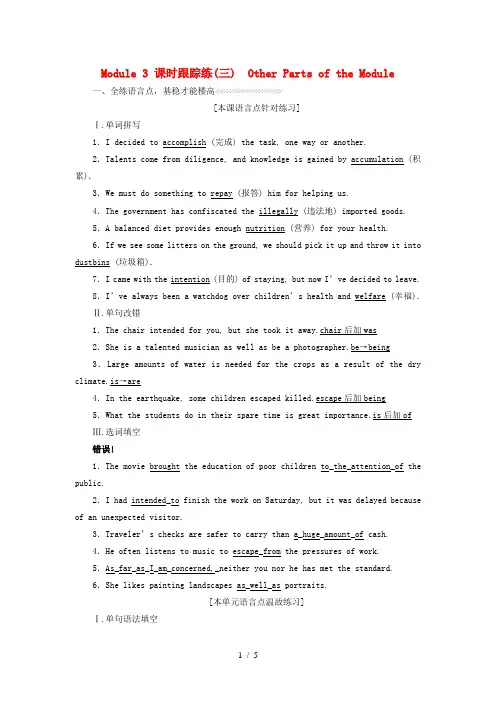
1 / 5 Module 3 课时跟踪练(三) Other Parts of the Module 一、全练语言点,基稳才能楼高 [本课语言点针对练习] Ⅰ.单词拼写 1.I decided to accomplish (完成) the task, one way or another. 2.Talents come from diligence, and knowledge is gained by accumulation (积累). 3.We must do something to repay (报答) him for helping us. 4.The government has confiscated the illegally (违法地) imported goods. 5.A balanced diet provides enough nutrition (营养) for your health. 6.If we see some litters on the ground, we should pick it up and throw it into dustbins (垃圾箱). 7.I came with the intention (目的) of staying, but now I’ve decided to leave. 8.I’ve always been a watchdog over children’s health and welfare (幸福). Ⅱ.单句改错 1.The chair intended for you, but she took it away.chair后加was 2.She is a talented musician as well as be a photographer.be→being 3.Large amounts of water is needed for the crops as a result of the dry climate.is→are 4.In the earthquake, some children escaped killed.escape后加being 5.What the students do in their spare time is great importance.is后加of Ⅲ.选词填空 错误! 1.The movie brought the education of poor children to_the_attention_of the public. 2.I had intended_to finish the work on Saturday, but it was delayed because of an unexpected visitor. 3.Traveler’s checks are safer to carry than a_huge_amount_of cash. 4.He often listens to music to escape_from the pressures of work. 5.As_far_as_I_am_concerned,_neither you nor he has met the standard. 6.She likes painting landscapes as_well_as portraits. [本单元语言点温故练习] Ⅰ.单句语法填空 2 / 5
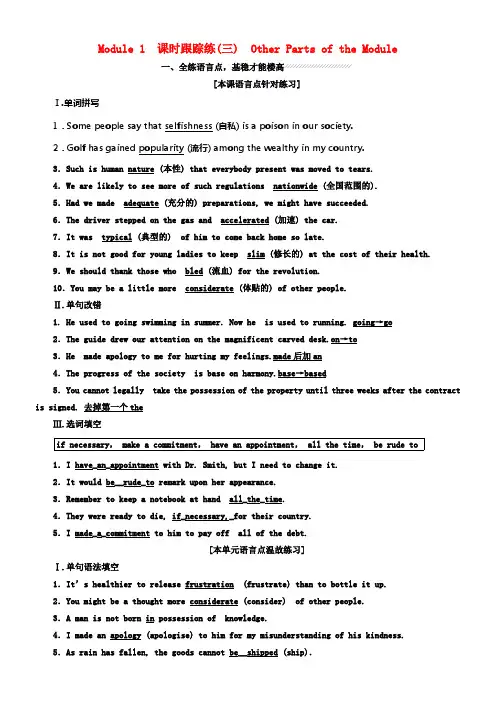
Module 1 课时跟踪练(三) Other Parts of the Module一、全练语言点,基稳才能楼高[本课语言点针对练习]Ⅰ.单词拼写1.Some people say that selfishness (自私) is a poison in our society.2.Golf has gained popularity (流行) among the wealthy in my country.3.Such is human nature (本性) that everybody present was moved to tears.4.We are likely to see more of such regulations nationwide (全国范围的).5.Had we made adequate (充分的) preparations, we might have succeeded.6.The driver stepped on the gas and accelerated (加速) the car.7.It was typical (典型的) of him to come back home so late.8.It is not good for young ladies to keep slim (修长的) at the cost of their health.9.We should thank those who bled (流血) for the revolution.10.You may be a little more considerate (体贴的) of other people.Ⅱ.单句改错1. He used to going swimming in summer. Now he is used to running. going→go2.The guide drew our attention on the magnificent carved desk.on→to3.He made apology to me for hurting my feelings.made后加an4.The progress of the society is base on harmony.base→based5.You cannot legally take the possession of the property until three weeks after the contract is signed. 去掉第一个theⅢ.选词填空if necessary, make a commitment, have an appointment, all the time, be rude to1.I have_an_appointment with Dr. Smith, but I need to change it.2.It would be__rude_to remark upon her appearance.3.Remember to keep a notebook at hand all_the_time.4.They were ready to die, if_necessary,_for their country.5.I made_a_commitment to him to pay off all of the debt.[本单元语言点温故练习]Ⅰ.单句语法填空1.It’s healthier to release frustration (frustrate) than to bottle it up.2.You might be a thought more considerate (consider) of other people.3.A man is not born in possession of knowledge.4.I made an apology (apologise) to him for my misunderstanding of his kindness.5.As rain has fallen, the goods cannot be__shipped (ship).6.As we know, reading books widely can widen (wide) your knowledge.7.I was the first to_arrive (arrive) at the inn and got the pick of rooms.8.When deeply absorbed (absorb) in work, which he often was, he would forget all about eating or sleeping.9.His foreign friend has become used to living (live) in China.10.To do her justice, we must admit that she did deserve_to_win (win).Ⅱ.完成句子1.The_instant__the_bus_stopped (公共汽车一停下来), about fifty people tried to crush in.2.At the beginning of the study the runners ran for about four hours a week on_average (平均).3.There_is_no_doubt_that (毫无疑问) it has its negative effects as well as positive effects.4.I might be away next week. If_so (若是如此的话) I won’t be able to see you.5.The theory based_on_a_series_of_wrong_assumptions (以一系列错误的假设为基础的) is of no value.6.The President is_committed_to_reforming (许诺要改革) health care.7.Children must attend_school (上学) between the ages of 5 and 16.8. People vary_in_taste (在爱好方面不同); some love music, some enjoy taking pictures, and still others are fond of climbing mountains.9.If we don’t concentrate_our_attention_on_our_work (专心于咱们的工作) we’ll make a mistake.10.He was_appointed_as (被录用为) the image ambassador of the charity activity.二、勤练高考题型,多练自能生巧Ⅰ.阅读明白得My grandfather Andy Anderson is 99. His life story is one for the big screen — he met my grandmother on a Saturday, and they married on the following Saturday. They stayed together until my grandma died 67 years later.Without going to college, Andy worked his way to the top. He became the manager of the dairy department of Safeway. He earned the nickname Mr.Cheese, which eventually turned into Grandpa Cheese among the family. He has taught me a lot and here’s what he has learned in his 99 years.Always maintain a good sense of humor. Find something humorous in every single situation. Never be too good to start at the bottom. Exercise every day, even when you don’t feel like it. Don’t spend more money than you make. Save your money now and spend it later.You must be able to forgive, even if it’s difficult to do. Love is not always easy; sometimes you have to work at it. Your family is the most precious thing you will ever have in life.If you’re faced with a problem, don’t delay trying to figure it out. But if there’s no wayto figure it out, you have to forget about it. Make sure you’re doing what you love; don’t be afraid to follow those dreams you have for yourself.School education is important, but not necessary. Life can be an education in itself. Explore your world and stay curious. Having a bad job is better than having no job at all. Try not to take yourself so seriously. Don’t ever be afraid to be your true self. Your life is delicate, and if you fail to take care of yourself properly, you’ll spoil.Life is a gift that you must unwrap (打开). It’s up to you to determine if what’s inside will lead you to happiness or dismay (沮丧). You have the power to make that decision for yourself.All of above come from Grandpa Cheese. If you’re wondering what Grandpa Cheese is up to these days, he’s riding his motorized scooter (踏板车) around Benicia, CA, and “planning on what I’m going to do when I start to get old,” he says.语篇解读:本文是一篇夹叙夹议的传记。
Module 3课时跟踪练(三) Other Parts of the Module 一、全练语言点,基稳才能楼高 [本课语言点针对练习] Ⅰ.单词拼写 1.A local journalist said that the volcano was in eruption (喷发). 2.Heavy rainfall ruined (毁坏) the game. 3.Kevin arrived late, but fortunately (幸运地) for him, everybody was too busy to notice. 4.The previous (以前的) party they gave was not as nice as this one. 5.He was anxious about the possibility (可能性) of losing all his money. 6.Just a word of warning (警告) — hotels in this area can be very expensive. 7.So many years have passed and the terrifying (可怕的) accident is still fresh in her mind. 8.The teacher suggested that every student take an active (积极的) part in English party. Ⅱ.单句改错 1.The doctor warned the patient to smoke.to前加not 2.Would you mind putting your cigarette through, please?through→out 3.Years of fighting have left the area in ruin. ruin→ruins 4.Six boys and two girls; that’s eight at all. at→in 5.About 40 percent of the population of that country lives on farms. lives→live 6.It is reported that there is still a possibility what the bad weather will continue. what→that Ⅲ.选词填空 take place, set fire to, catch fire, put out, cover an area of, according to, in all, if necessary, damage, ruin 1.He put_out the fire with a piece of wet carpet. 2.Our school covers_an_area_of 400 acres, which is twice as big as yours. 3.There will be a large number of people attending the lecture according_to today’s paper. 4.Don’t forget to take your cellphone with you in case you can call for help if_necessary. 5.Luckily, the accident didn’t do much damage to either of the cars. 6.I caught a bad cold the other day and my weekend has been ruined. 7.The man in black was about to set_fire_to the house when the police came. 8.The teacher said there were twelve in_all who had failed in the exam. 9.The driver got out of the car directly it caught_fire. 10.The fire took_place last night and many houses were burnt down. [本单元语言点温故练习] Ⅰ.单句语法填空 1.They are looking for some people who have some work experience (experience), speak English and want to experience another culture. 2.That area was hit by an unexpected heavy rain, and it caused (cause) a severe flood. 3.It occurred to her that she might adopt a homeless child. 4.The mini bus picked up passengers along the narrow road, which greatly slowed us down. 5.Mary is really good at taking notes in class. She can put down almost every word her teacher says. 6.Could you please help me take the lid off the jar? 7.The teacher stressed again that the students should not leave out any important details while retelling the story. 8.When I arrived at the airport I realized that I had left my ticket behind. 9.On average, there are twenty boys present every day. 10.By the time he was 12, he had_travelled (travel) to more than 30 countries. Ⅱ.完成句子 1.The classroom had_been_cleaned before we came. 我们到之前,教室已经被打扫干净了。 2.Had_the_fire_been_put_out when the fire fighters arrived? 消防队员到达时火已经被扑灭了吗? 3.The new plan had_been_carried_out before the second experiment began. 这项新计划在第二次试验开始之前就已经实施了。 4.Much_work_had_been_done before she arrived here. 她到达这里之前,很多工作已经做完了。 5.She said her brother wanted_to_go_with_her. 她说她弟弟想跟她一起去。 6.He asked me if_I_was_coming_the_next_day. 他问我第二天是否要来。 7.He told me that he_had_left_his_book in my room. 他告诉我他把书落在我的房间里了。 8.She asked me whether_I_had_known what had happened. 她问我是否已经知道了发生的一切。 二、勤练高考题型,多练自能生巧 Ⅰ.阅读理解 Laptop computers are popular all over the world. People use them on trains and airplanes, in airports and hotels. These laptops connect people to their workplace. In the United States today, laptops also connect students to their classrooms. Westlake College in Virginia will start a laptop computer program that allows students to do schoolwork anywhere they want. Within five years, each of the 1,500 students at the college will receive a laptop. The laptops are part of a $10 million computer program at Westlake, a 110yearold college. The students with laptops will also have access to the Internet. In addition, they will be able to use email to “speak” with their teachers, their classmates, and their families. However, the most important part of the laptop program is that students will be able to use computers without going to computer labs. They can work with it at home, in a fastfood restaurant or under the trees — anywhere at all! Because of the many changes in computer technology, laptop use in higher education, such as colleges and universities, is workable. As laptops become more powerful, they become more similar to desktop computers. In addition, the portable computers can connect students to not only the Internet, but also libraries and other resources. State highereducation officials are studying how laptops can help students. State officials are also testing laptop programs at other universities, too. At Westlake College, more than 60 percent of the staff use computers. The laptops will allow all teachers to use computers in their lessons. As one Westlake teacher said, “Here we are in the middle of Virginia and we’re giving students a window on the world. They can see everything and do everything.” 语篇解读:本文讲述了西湖大学正准备启动一个笔记本项目,它计划在五年之内为学校的每一位学生配备一台电脑。 1.The main purpose of the laptop program is to give each student a laptop to